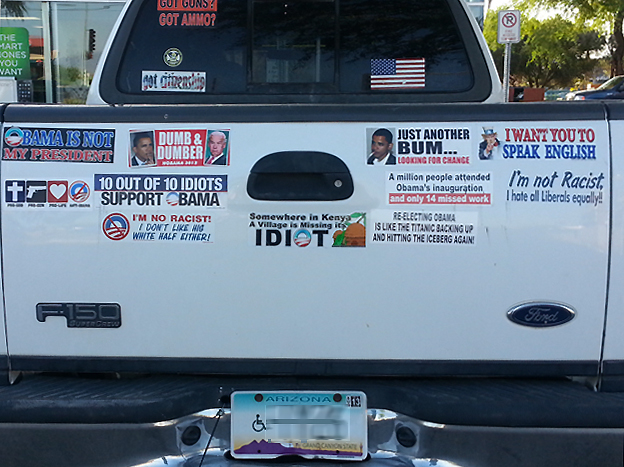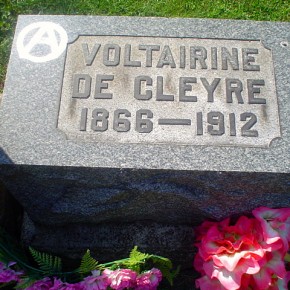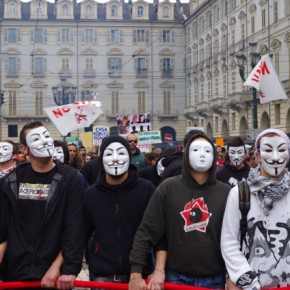Hour after hour, I’m bombarded with reasons to dislike Barack Obama. He has conceded too much ground on what’s left of the American safety net. He hasn’t conceded enough on executive privilege. He keeps talking the talk, but refuses to walk the walk. An American Tony Blair, a wolf in sheep’s clothing. Enough of this relentless assault and I’m ready to disown him. But then I see something like this.
The part of the United States where I live is full of vehicles like this one, their rear ends turned into mobile billboards, denouncing the President in the most brutal terms. Sometimes the critique sticks to the issues, after a fashion, and simply takes Obama to task for promoting the agenda of Big Government. More often, though, it has a personal dimension that goes far beyond reasonable political discourse. The President doesn’t get blamed for specific policies so much as the fact that he exists at all.
The racial dimension to this demonization is hard to overlook. Even if Obama isn’t portrayed according to the worst plantation stereotypes, either lazy and dimwitted or cunning and dangerous — or an improbable hybrid of these traits — he is identified with the “parasites” who are: blacks, Mexicans and anyone else who deviates from a white, suburban, Christian ideal.
Take the bumper sticker on this truck that shows the President with a cigarette sticking out of his mouth next to the slogan, “Just another bum looking for change”, or the one playing off his iconic campaign graphic from 2008 that reads “Somewhere in Kenya a village is missing its idiot.” These explicit attacks on Obama himself combine with more general content, such as the image of Uncle Sam next to the words “I want you to speak English,” to reach a level of vitriol towards the current Administration that would be considered treasonous in most countries.
Part of me still believes in the notion that there must be something healthy about a society in which such hateful messages can be disseminated without fear of reprisal. And part of me knows full well that, if the situation were reversed and my own political convictions were broadcast in this manner, I would worry about the safety of my loved ones. Because even though the United States remains the proverbial “free country” compared to most nations, its liberties are not evenly distributed.
To be sure, there are places where the driver of a vehicle like this one would be made to feel unwelcome, like college towns and the liberal pockets on the coasts. But that sense of being a minority would rarely compare with its equivalent in the hinterland, because there’s a major difference between disapproval backed purely by words and the sort that is communicated with the barrel of a gun. “Pro-God, Pro-Gun, Pro-Life, Anti-Obama” is not a message to be taken lightly.
I remember the sense of powerlessness I felt years ago when, as I tried to cross the pavement with my then-small daughter, a similarly festooned white pick-up truck kept inching forward to prevent us from making it safely across. When I gestured to the driver to give us room, he leapt out of the cab and announced to me — and ten other patrons of this drive-through Starbucks — that he was a Justice of the Peace and could shoot me dead, right on the spot, without ever having to worry about legal trouble. He was exaggerating, surely, in the way that men of a certain stamp are prone to do. But the gun in the holster on his belt made it abundantly clear that it wasn’t worth calling his bluff.
In the decade-plus that I’ve lived in the state of Arizona, I’ve had plenty more encounters of this sort. And, while I have learned to defuse them fairly well — often by conceding points in person that I would never concede in print or online — I also go out of my way to avoid them from the get-go. That’s why the cars I drive are devoid of political slogans and why I do what I otherwise can to be a stealthy progressive, keeping my positions to myself unless I’m in the privacy of my own home.
For all these reasons, when I run into expressions of hatred like this one, I find myself questioning the increasingly harsh critiques of the President that the Left has been making. Because, as disappointing as Obama has been for the millions who deluded themselves into believing he was some sort of political messiah, he has to be judged in relation to the constraints on his liberty of action. When so many people hate you so much and when those same people proudly trumpet that they are armed and dangerous, finding the courage of your convictions can be a challenge.
Yes, Obama has a security detail to keep him safe. And, yes, he still has millions and millions of loyal supporters. But the same could have been said about the President he has clearly tried to fashion himself after: Abraham Lincoln. Although Obama’s legacy is unlikely to be anywhere near as impressive as that of the United States’ most iconic leader, he shares with that fellow Illinois politician the burden of being in the crosshairs of enemies who see him as a symbol — of everything they fear and loathe — rarely than a human being.
So where does that leave someone like me, who has no trouble acknowledging the President’s faults, but also never expected him to be faultless? If his enemies are also my enemies, is he then what Carl Schmitt would call a “friend”? To what extent has the pressure exerted on the White House from the Right been responsible for Obama’s consistent failure to maintain truly progressive positions?
Questions like these plague me after every encounter with a vehicle like this one. But my initial response is far less rational. I want to lash out, with whatever means at my disposal, at the perpetrators of such hateful rhetoric. I want to lash out, even though I know that doing so would multiply the hate instead of countering it with more hopeful sentiments. I want to lash out, because reading this invective makes me feel the sting of the lash every time, that burning realization that we’re still a long, long way from letting people be judged by the content of their character.
I want to lash out, even though that I know that to do so would be to multiply the hate instead of trying to counter it with more hopeful sentiments.
Commentary and photograph courtesy of Charlie Bertsch.





